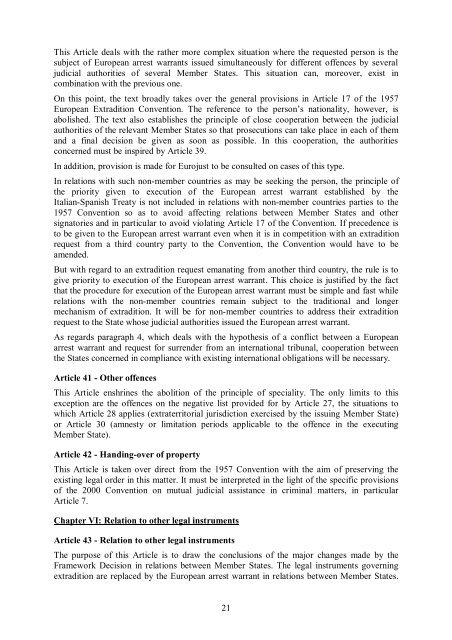the European arrest warrant - Statewatch
the European arrest warrant - Statewatch
the European arrest warrant - Statewatch
You also want an ePaper? Increase the reach of your titles
YUMPU automatically turns print PDFs into web optimized ePapers that Google loves.
This Article deals with <strong>the</strong> ra<strong>the</strong>r more complex situation where <strong>the</strong> requested person is <strong>the</strong><br />
subject of <strong>European</strong> <strong>arrest</strong> <strong>warrant</strong>s issued simultaneously for different offences by several<br />
judicial authorities of several Member States. This situation can, moreover, exist in<br />
combination with <strong>the</strong> previous one.<br />
On this point, <strong>the</strong> text broadly takes over <strong>the</strong> general provisions in Article 17 of <strong>the</strong> 1957<br />
<strong>European</strong> Extradition Convention. The reference to <strong>the</strong> person’s nationality, however, is<br />
abolished. The text also establishes <strong>the</strong> principle of close cooperation between <strong>the</strong> judicial<br />
authorities of <strong>the</strong> relevant Member States so that prosecutions can take place in each of <strong>the</strong>m<br />
and a final decision be given as soon as possible. In this cooperation, <strong>the</strong> authorities<br />
concerned must be inspired by Article 39.<br />
In addition, provision is made for Eurojust to be consulted on cases of this type.<br />
In relations with such non-member countries as may be seeking <strong>the</strong> person, <strong>the</strong> principle of<br />
<strong>the</strong> priority given to execution of <strong>the</strong> <strong>European</strong> <strong>arrest</strong> <strong>warrant</strong> established by <strong>the</strong><br />
Italian-Spanish Treaty is not included in relations with non-member countries parties to <strong>the</strong><br />
1957 Convention so as to avoid affecting relations between Member States and o<strong>the</strong>r<br />
signatories and in particular to avoid violating Article 17 of <strong>the</strong> Convention. If precedence is<br />
to be given to <strong>the</strong> <strong>European</strong> <strong>arrest</strong> <strong>warrant</strong> even when it is in competition with an extradition<br />
request from a third country party to <strong>the</strong> Convention, <strong>the</strong> Convention would have to be<br />
amended.<br />
But with regard to an extradition request emanating from ano<strong>the</strong>r third country, <strong>the</strong> rule is to<br />
give priority to execution of <strong>the</strong> <strong>European</strong> <strong>arrest</strong> <strong>warrant</strong>. This choice is justified by <strong>the</strong> fact<br />
that <strong>the</strong> procedure for execution of <strong>the</strong> <strong>European</strong> <strong>arrest</strong> <strong>warrant</strong> must be simple and fast while<br />
relations with <strong>the</strong> non-member countries remain subject to <strong>the</strong> traditional and longer<br />
mechanism of extradition. It will be for non-member countries to address <strong>the</strong>ir extradition<br />
request to <strong>the</strong> State whose judicial authorities issued <strong>the</strong> <strong>European</strong> <strong>arrest</strong> <strong>warrant</strong>.<br />
As regards paragraph 4, which deals with <strong>the</strong> hypo<strong>the</strong>sis of a conflict between a <strong>European</strong><br />
<strong>arrest</strong> <strong>warrant</strong> and request for surrender from an international tribunal, cooperation between<br />
<strong>the</strong> States concerned in compliance with existing international obligations will be necessary.<br />
Article 41 - O<strong>the</strong>r offences<br />
This Article enshrines <strong>the</strong> abolition of <strong>the</strong> principle of speciality. The only limits to this<br />
exception are <strong>the</strong> offences on <strong>the</strong> negative list provided for by Article 27, <strong>the</strong> situations to<br />
which Article 28 applies (extraterritorial jurisdiction exercised by <strong>the</strong> issuing Member State)<br />
or Article 30 (amnesty or limitation periods applicable to <strong>the</strong> offence in <strong>the</strong> executing<br />
Member State).<br />
Article 42 - Handing-over of property<br />
This Article is taken over direct from <strong>the</strong> 1957 Convention with <strong>the</strong> aim of preserving <strong>the</strong><br />
existing legal order in this matter. It must be interpreted in <strong>the</strong> light of <strong>the</strong> specific provisions<br />
of <strong>the</strong> 2000 Convention on mutual judicial assistance in criminal matters, in particular<br />
Article 7.<br />
Chapter VI: Relation to o<strong>the</strong>r legal instruments<br />
Article 43 - Relation to o<strong>the</strong>r legal instruments<br />
The purpose of this Article is to draw <strong>the</strong> conclusions of <strong>the</strong> major changes made by <strong>the</strong><br />
Framework Decision in relations between Member States. The legal instruments governing<br />
extradition are replaced by <strong>the</strong> <strong>European</strong> <strong>arrest</strong> <strong>warrant</strong> in relations between Member States.<br />
21
















